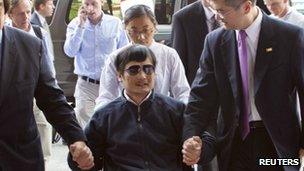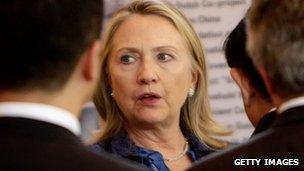China microbloggers fear for Chen Guangcheng's safety
- Published

Online activists have been fearful for Mr Chen's safety
Claims that Chinese dissident Chen Guangcheng left the US embassy in Beijing after pressure and threats to his family have sparked further debate and speculation online.
Mr Chen left the embassy for hospital treatment on Wednesday morning, but has since said that he fears for his life, and appealed for help from US President Barack Obama.
The turn of events has sparked concern - and criticism of the US - from Chinese microbloggers.
"Although he is blind, he has only recently experienced true darkness," one user wrote on Weibo, a Chinese microblog.
Despite the news of Chen Guangcheng's escape from house arrest being widely reported in international media, Chinese state media and microblogs are tightly controlled, and many Chinese do not know who he is.
However, many of those who do know have been following the turn of events closely, and expressed support for Mr Chen's request to leave China.
Users have tried to make sense of Mr Chen's change of heart.
One Twitter user believed that he initially had confidence in the assurances from the Chinese authorities, believing that the Shandong local government was responsible for his ill-treatment during his house arrest.
"But the news he received after leaving the embassy made him understand that his treatment was endorsed by the wider state system, and he became fearful," he tweeted.
American politics
There has been cynicism towards the US. Twitter user Jian Alan Huang said: "It can't have been easy for Hillary [Clinton]. All she wanted to do was to sell two planes and leave, and didn't expect to walk into such a mess."
However, others have acknowledged the difficult position the US is in.
"The Americans have done their best, although Obama really can't compare with President Bush," said one Weibo user, in an apparent reference to George Bush Sr, who had granted protection to government critic Fang Lizhi in 1989.
Online users have also discussed the wider politics likely to be at play.
"The Republican presidential candidate has already said that America should not abandon Chen, so, taking two-party politics into account, Obama is also unlikely to choose to abandon Chen - that's a losing move. It is essential to maintain pressure on the American government, but we also need to stay calm, and allow China and the US some space for further negotiations," Weibo user Enoch Lu posted.
User Zhang Dajun 10, based in the US, said: "Now is the time to criticise the American government, because the American leadership care about public opinion."
However, he was also critical of the US officials who spoke to Mr Chen: "The US participated in the misleading and deceiving of Chen in practice... they knew what fate would await Chen once he left the embassy."
While many users hope that Mr Chen can leave China, others have expressed hopes that he will stay.
"I hope the Chinese government can treat our people well and also hope Chen Guangcheng could make a wise choice and stay in China and continue to play his role," Cheng Shen posted on the BBC Chinese website.
Another user, Yearning for Freedom, agreed that this would be the best solution.
"From the beginning, I think the best ending is that Chen Guangcheng would choose to stay and live in China. It looks like the situation is developing towards this direction. In my opinion, this is a great progress in terms of human rights in China," they said.
Amid the support for Mr Chen online, there were some critical voices. One user on Youtube said: "Why should you go to another country with your own country's problems? This person is creating opportunities for other countries to intervene in China's internal politics."
Censorship

Netizens have widely debated the US's next step
Weibo is still heavily censored, and search terms related to Mr Chen have been blocked.
Banned search terms include Mr Chen's full name, an abbreviation of his name (CGC), his village, a form of the word "embassy" and "pearl" - the nickname of a woman who reportedly drove him from Shandong to safety.
Chinese users have responded by changing the phrases they use, and posting images and screen shots that censors are less likely to pick up. The majority of Weibo posts about Chen Guangcheng now refer to him solely as "Chen".
Users have also made wider allusions and general comments to dodge the censors.
One user posted: "Don't think that politics has nothing to do with you, unless you intend to live like a pig... don't say that other's suffering has nothing to do with you, because you cannot guarantee that such suffering won't fall on you one day. All for one, one for all."
There were also signs that Chen's supporters continued to be under tight state surveillance.
Zeng Jinyan, the wife of activist Hu Jia, had posted a photo of Chen and Hu meeting after Chen's escape. She said on Twitter that she was followed by state security this morning when she took her child to kindergarten.
"They later told me: 'We will do our best to help you take your child to and from school, and look after your everyday needs, but you cannot leave the house again for the next few days'."
She later tweeted: "Friends in the media, please don't call me any more. Please understand my situation."
Teng Biao, a human rights lawyer and friend of Mr Chen, had been in close contact with Mr Chen, and posted a transcript of his phone conversations with Mr Chen online.
Later, he also asked the media not to call him.
"Apologies! I have already said most of what I can say. I will say more if necessary," he wrote.
He added that he was taking the safety of Mr Chen's family, and his own, into consideration.